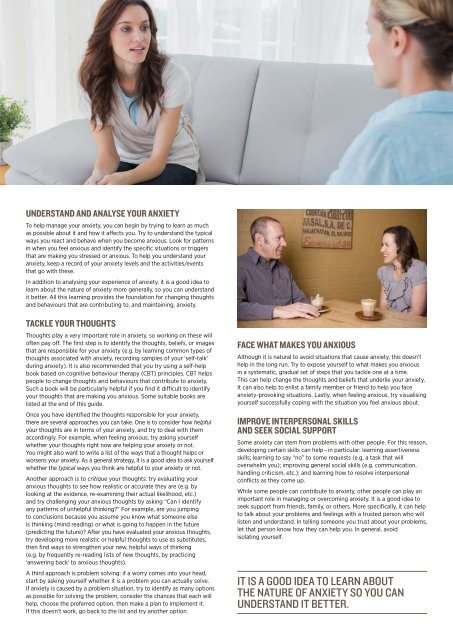WHAT CAN I DO TO HELP MYSELF WITH ANXIETY?
OWCwQRQq
OWCwQRQq
Create successful ePaper yourself
Turn your PDF publications into a flip-book with our unique Google optimized e-Paper software.
UNDERSTAND AND ANALYSE YOUR <strong>ANXIETY</strong><br />
To help manage your anxiety, you can begin by trying to learn as much<br />
as possible about it and how it affects you. Try to understand the typical<br />
ways you react and behave when you become anxious. Look for patterns<br />
in when you feel anxious and identify the specific situations or triggers<br />
that are making you stressed or anxious. To help you understand your<br />
anxiety, keep a record of your anxiety levels and the activities/events<br />
that go with these.<br />
In addition to analysing your experience of anxiety, it is a good idea to<br />
learn about the nature of anxiety more generally, so you can understand<br />
it better. All this learning provides the foundation for changing thoughts<br />
and behaviours that are contributing to, and maintaining, anxiety.<br />
TACKLE YOUR THOUGHTS<br />
Thoughts play a very important role in anxiety, so working on these will<br />
often pay off. The first step is to identify the thoughts, beliefs, or images<br />
that are responsible for your anxiety (e.g. by learning common types of<br />
thoughts associated with anxiety, recording samples of your ‘self-talk’<br />
during anxiety). It is also recommended that you try using a self-help<br />
book based on cognitive behaviour therapy (CBT) principles. CBT helps<br />
people to change thoughts and behaviours that contribute to anxiety.<br />
Such a book will be particularly helpful if you find it difficult to identify<br />
your thoughts that are making you anxious. Some suitable books are<br />
listed at the end of this guide.<br />
Once you have identified the thoughts responsible for your anxiety,<br />
there are several approaches you can take. One is to consider how helpful<br />
your thoughts are in terms of your anxiety, and try to deal with them<br />
accordingly. For example, when feeling anxious, try asking yourself<br />
whether your thoughts right now are helping your anxiety or not.<br />
You might also want to write a list of the ways that a thought helps or<br />
worsens your anxiety. As a general strategy, it is a good idea to ask yourself<br />
whether the typical ways you think are helpful to your anxiety or not.<br />
Another approach is to critique your thoughts: try evaluating your<br />
anxious thoughts to see how realistic or accurate they are (e.g. by<br />
looking at the evidence, re-examining their actual likelihood, etc.)<br />
and try challenging your anxious thoughts by asking “Can I identify<br />
any patterns of unhelpful thinking?” For example, are you jumping<br />
to conclusions because you assume you know what someone else<br />
is thinking (mind reading) or what is going to happen in the future<br />
(predicting the future)? After you have evaluated your anxious thoughts,<br />
try developing more realistic or helpful thoughts to use as substitutes,<br />
then find ways to strengthen your new, helpful ways of thinking<br />
(e.g. by frequently re-reading lists of new thoughts, by practicing<br />
‘answering back’ to anxious thoughts).<br />
A third approach is problem solving: if a worry comes into your head,<br />
start by asking yourself whether it is a problem you can actually solve.<br />
If anxiety is caused by a problem situation, try to identify as many options<br />
as possible for solving the problem, consider the chances that each will<br />
help, choose the preferred option, then make a plan to implement it.<br />
If this doesn’t work, go back to the list and try another option.<br />
FACE <strong>WHAT</strong> MAKES YOU ANXIOUS<br />
Although it is natural to avoid situations that cause anxiety, this doesn’t<br />
help in the long run. Try to expose yourself to what makes you anxious<br />
in a systematic, gradual set of steps that you tackle one at a time.<br />
This can help change the thoughts and beliefs that underlie your anxiety.<br />
It can also help to enlist a family member or friend to help you face<br />
anxiety-provoking situations. Lastly, when feeling anxious, try visualising<br />
yourself successfully coping with the situation you feel anxious about.<br />
IMPROVE INTERPERSONAL SKILLS<br />
AND SEEK SOCIAL SUPPORT<br />
Some anxiety can stem from problems with other people. For this reason,<br />
developing certain skills can help – in particular: learning assertiveness<br />
skills; learning to say “no” to some requests (e.g. a task that will<br />
overwhelm you); improving general social skills (e.g. communication,<br />
handling criticism, etc.); and learning how to resolve interpersonal<br />
conflicts as they come up.<br />
While some people can contribute to anxiety, other people can play an<br />
important role in managing or overcoming anxiety. It is a good idea to<br />
seek support from friends, family, or others. More specifically, it can help<br />
to talk about your problems and feelings with a trusted person who will<br />
listen and understand. In telling someone you trust about your problems,<br />
let that person know how they can help you. In general, avoid<br />
isolating yourself.<br />
IT IS A GOOD IDEA <strong>TO</strong> LEARN ABOUT<br />
THE NATURE OF <strong>ANXIETY</strong> SO YOU <strong>CAN</strong><br />
UNDERSTAND IT BETTER.


